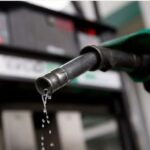Nigeria’s Fuel Crisis Deepens: Price Approaches ₦1,000 as Tensions Rise

From Lagos to Kano, Abuja to Port Harcourt, motorists are being forced to queue for hours—if they can find fuel at all. Where petrol is available, black-market prices range between ₦950 and ₦1,200 per litre, depending on the location. Even licensed retail outlets are selling above the official range, blaming a combination of supply shortages, logistics bottlenecks, and rising international oil prices.
Marketers vs. Retailers: A Blame Game Unfolds
As the crisis intensifies, major players in the downstream sector have begun trading accusations. Independent marketers argue that retailers are engaging in artificial scarcity and profiteering, while retailers claim marketers are hoarding supplies and inflating depot prices.
“We buy fuel from depots at over ₦900 per litre. How do you expect us to sell it for less at the pump?” said a station manager in Ibadan, speaking under anonymity. “The problem starts from the top of the supply chain.”
Meanwhile, petroleum marketers maintain they are not the cause of the price hike. “Forex constraints, high transport costs, and insecurity along supply routes have made distribution more expensive,” said one senior member of the Independent Petroleum Marketers Association of Nigeria (IPMAN). “It’s unfair to blame retailers who are simply trying to stay in business.”
Economic Ripple Effects
The rise in fuel prices is already impacting other sectors of the economy. Transport fares have increased sharply, food prices are climbing, and small businesses that depend on petrol generators are struggling to cope. In a country where millions rely on petrol-powered alternatives due to poor electricity supply, the consequences are far-reaching.
“I now spend more on transport than on feeding,” lamented a commuter in Lagos. “Everything is going up except salaries.”
Economists warn that without swift government intervention, Nigeria may face an inflationary spiral that could further erode purchasing power and heighten poverty levels.
Government Response: Too Little, Too Late?
Despite repeated promises, the federal government has yet to present a clear, sustainable plan to resolve the crisis. The deregulation of the downstream sector was supposed to encourage competition and stabilize prices, but critics argue that it has only opened the door for unregulated pricing and exploitation.
In recent remarks, the Nigerian Midstream and Downstream Petroleum Regulatory Authority (NMDPRA) said it was “monitoring the situation closely,” but stopped short of announcing any concrete policy measures.
Industry observers say the lack of a national strategic fuel reserve and poor refining capacity are core problems. With Nigeria continuing to import most of its refined products, global oil market fluctuations and forex volatility have left the nation vulnerable.
A Crisis That Won’t Go Away
For many Nigerians, the fuel crisis is not new—but this time feels different. The frequency and severity of price hikes, coupled with minimal government cushioning, have left citizens exasperated.
“If fuel reaches ₦1,000 per litre, what will happen next?” asked a roadside vendor in Abuja. “We are already stretched to the limit.”
As fuel prices inch toward ₦1,000, the question remains: how much longer can Nigerians endure the economic and social strain without d
ecisive leadership?
TRENDING SONGS
 NPMA Appeals to Nigerian Government for Compensation After Lagos Market Fire
NPMA Appeals to Nigerian Government for Compensation After Lagos Market Fire
 Rest Every Four Hours, FRSC Issues Safety Guide for Fasting Motorists
Rest Every Four Hours, FRSC Issues Safety Guide for Fasting Motorists
 NNPC Boss Ojulari Bags UK Energy Institute Fellowship
NNPC Boss Ojulari Bags UK Energy Institute Fellowship
 Shock in Anambra: Bride Disappears Moments Before Wedding
Shock in Anambra: Bride Disappears Moments Before Wedding
 Nigerian Woman Returns ₦330 Million Accidentally Credited to Her Account
Nigerian Woman Returns ₦330 Million Accidentally Credited to Her Account
 APC Don Reach Morocco?’ VeryDarkMan Reacts to Seyi Tinubu Poster
APC Don Reach Morocco?’ VeryDarkMan Reacts to Seyi Tinubu Poster
 Bride Breaks Down in Tears as Wedding Meals Were Kept Secretly While Guests Go Home Hungry
Bride Breaks Down in Tears as Wedding Meals Were Kept Secretly While Guests Go Home Hungry
 Odogwu by Day, Robber by Night: How Marriage Joy Turned Into Tragedy
Odogwu by Day, Robber by Night: How Marriage Joy Turned Into Tragedy
 Nigerian Officials Allegedly Pocket N4–6B Weekly Through Smuggling Cartels at Seme–Badagry Border
Nigerian Officials Allegedly Pocket N4–6B Weekly Through Smuggling Cartels at Seme–Badagry Border
 Ahmad Yerima: Naval Officer to Face No Sanctions After Clash with Wike – Matawalle
Ahmad Yerima: Naval Officer to Face No Sanctions After Clash with Wike – Matawalle
Share this post with your friends on ![]()













